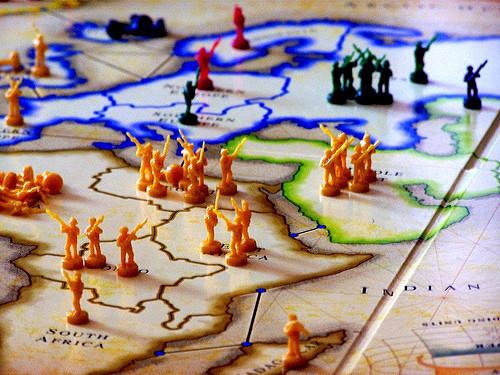Some thoughts on strategy
Posted By Alan Stephens on September 28, 2016 @ 12:30

‘Strategy’ is one of those words that’s used so widely and in so many different contexts that it often seems to generate confusion. That doesn’t need to be the case, as the nature of Australia’s long-running involvement in the wars in the Middle East can be used to illustrate.
Writing in the Fairfax media several months ago about the West’s 15-years-and-counting war in Afghanistan, former chief of Army, now University of Canberra professor, Peter Leahy stated [1] that, ‘Over time, our politicians did not tell us much of our strategy. There is a good excuse—we didn’t have one’.
Professor Leahy’s assertion warrants examination at several levels.
First, at the national (grand) strategic level, Australia unquestionably had a strategy, which was to serve our perceived interests by supporting our major ally, the United States. Indeed, that approach has been a constant in our defence policy for more than one hundred years, since federation.
In the case of Afghanistan, it could also reasonably be argued that it was in our interest to oppose the danger represented by the Taliban and, more generally, by Islamic extremism, as far away from home as possible.
Second, at the military (operational) level, we also had a strategy, namely, the theory of counter-insurgency warfare. Promoted zealously by Western generals since World War II, Coin operations were supposed to secure victory by ‘isolating’ the enemy, ‘pacifying’ hostile populations, ‘winning hearts and minds’, and so on.
But in wars in Algeria, Somalia, Vietnam, Iraq and Afghanistan, Coin has been exposed as an intellectually unsustainable theory: as nothing more than a series of hollow slogans.
In every case, the end result was a gradual slide into military failure, which in turn caused the gradual loss of public and, therefore, political support at home.
The reason for that failure is not difficult to identify.
Again in every case, Western strategists were extraordinarily dismissive of the values of the countries their forces invaded. What was their history? What did their dominant religious beliefs imply? What did their thousands of years of distinctive social morés indicate? How had previous invasions fared? How did they regard the West? And so on. The fact is that it is very hard to ‘fight amongst the people’ when most of those people don’t want you there.
In short, the West, including Australia, did have a strategy in Afghanistan—it’s just that it wasn’t a very good one.
Professor Leahy also criticised the Australian government for not identifying an ‘end-state’ for the war in Afghanistan. But the dogma that strategy must have a clearly-defined end-state is another questionable proposition.
In an ideal world, establishing an optimal end-state is a good thing. But ‘ideal’ scarcely describes the situation in Afghanistan, or Iraq-Syria, which by any measure is complex in the extreme. And in the real world, it is infinitely better to be flexible than to cling to a thoroughly bad plan.
Thus, the end-state defined by the second Bush Administration prior to the invasions of Afghanistan in 2001 and Iraq in 2003 of to ‘win’ (whatever that might mean) and to ‘establish democracy’ were unrealistic. Ideology had usurped rational analysis.
It shouldn’t have been a surprise that West’s strategy failed in both instances, as it had 30 years before in Vietnam.
Under the Obama Administration, since about 2010, the West’s military strategy in Afghanistan and Iraq-Syria implicitly has changed to one of containment; that is, of containing the damage at an acceptable cost to the US and its allies while the core issues that are now driving those conflicts—civil war, religious war, and regional power struggles—play themselves out.
In the circumstances, that’s a reasonable objective. Indeed, such is the extent of the mess on the ground that restraining what’s happening is not merely the West’s best option, it’s pretty well the only one. It’s consistent with the objective circumstances in the Middle East; and it’s realistic in terms of what the West can do, as opposed to what it might like to do.
There’s a clear message here for the people who determine Australian defence strategy.
Article printed from The Strategist: https://aspistrategist.ru
URL to article: /some-thoughts-on-strategy/
URLs in this post:
[1] Peter Leahy stated: http://www.smh.com.au/federal-politics/political-news/australia-had-no-strategy-in-afghanistan-and-allies-are-struggling-says-former-army-chief-peter-leahy-20160222-gn0hzz.html
Click here to print.